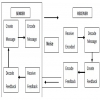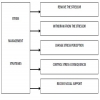Management Concepts & Organisational Behaviour - Communication
Barriers fo Communication
Posted On :
It is not possible that every time an order, instruction, guideline, direction, programme, information etc, transmitted by the superior is properly understood and assimilated by those for whom it is intended.
Barriers
to Communication
It is not possible that every time an order, instruction, guideline, direction, programme, information etc, transmitted by the superior is properly understood and assimilated by those for whom it is intended. Similarly suggestions, reports, advice, recommendations, complaints, etc., transmitted by the sub-ordinates to their superiors may be misunderstood or mis-interpreted. In any case, the objectives of communication are defeated.
As such, the process of
communication is not always smooth. It is obstructed by many obstacles. These
are referred to as barriers of communication. It refers to those factors which
cause disturbance either in the mind of the communicator or the communicatee or
in the process, which will create distortion of the message, leading to lack of
the response, ignoring or mis-understanding. The important barriers to
effective communication are:
The first and the most common barrier in the process of communication is bad expression. This means that the messages suffer from omissions, uncertainty, inaccuracies, verbosity, repetitions, ambiguity, lack of clarity and precision. In order to remove this, the staff should be trained to draft various kinds of effective communication. This will save time because otherwise much time has to be devoted in giving subsequent clarifications.
Decisions are generally conveyed from the top to the lower level. The superiors are known for their specialised knowledge. They generally draft messages in a technical language which may not be clearly understood by those who have to implement the decisions. Even if they are able to understand, they may not be able to convey it further down the line in simple words.
In many such cases, it becomes necessary to translate the subject matter or the message into a simpler language, i.e., the language which the Communicatee can understand easily. But the translation may be done inaccurately. Sometimes the translator is not in a position to find out the equivalent of many terms. With the result, the translation leads to further confusion. It becomes necessary that competent persons are appointed for the job and are provided the necessary equipment for the execution of the entrusted tasks.
Inattention is a very common and chronic human failing. This barrier generally arises in case of oral communication. It can be illustrated with the help of the following example: a superior is giving a message on the telephone. The subordinate is busy reading a magazine or looking through the window or his mind is occupied with some family problem. Superiors have to face this problem of inattention quite frequently. Efforts to communicate fails. The communicator should choose the appropriate time for communicating. Thus, for example, communicating at lunch hour or while at rest will not invite due attention. Holding a meeting at an odd time or calling the worker over for a talk on a holiday are some other examples.
Loss in transmission is another barrier of communication which arises in oral communication. When messages are conveyed from the higher to the lower level step by step, much of it is likely to be lost in transit. This problem may arise in case of written communication as well. At every level the superior will interpret the message which is likely to be distorted. Further, the meaning will change if some words ar are dropped, changed or misspelt. Harold Koontz and Cyril O’Donnell estimate that about 30% of the information is lost in each transmission. Written communications too are subject to loss in transmission. It is no wonder that enterprises often operate in a cloud of ignorance.
It is not possible that every time an order, instruction, guideline, direction, programme, information etc, transmitted by the superior is properly understood and assimilated by those for whom it is intended. Similarly suggestions, reports, advice, recommendations, complaints, etc., transmitted by the sub-ordinates to their superiors may be misunderstood or mis-interpreted. In any case, the objectives of communication are defeated.
Ineffective Expression
The first and the most common barrier in the process of communication is bad expression. This means that the messages suffer from omissions, uncertainty, inaccuracies, verbosity, repetitions, ambiguity, lack of clarity and precision. In order to remove this, the staff should be trained to draft various kinds of effective communication. This will save time because otherwise much time has to be devoted in giving subsequent clarifications.
Inaccurate Translation
Decisions are generally conveyed from the top to the lower level. The superiors are known for their specialised knowledge. They generally draft messages in a technical language which may not be clearly understood by those who have to implement the decisions. Even if they are able to understand, they may not be able to convey it further down the line in simple words.
In many such cases, it becomes necessary to translate the subject matter or the message into a simpler language, i.e., the language which the Communicatee can understand easily. But the translation may be done inaccurately. Sometimes the translator is not in a position to find out the equivalent of many terms. With the result, the translation leads to further confusion. It becomes necessary that competent persons are appointed for the job and are provided the necessary equipment for the execution of the entrusted tasks.
Inattention
Inattention is a very common and chronic human failing. This barrier generally arises in case of oral communication. It can be illustrated with the help of the following example: a superior is giving a message on the telephone. The subordinate is busy reading a magazine or looking through the window or his mind is occupied with some family problem. Superiors have to face this problem of inattention quite frequently. Efforts to communicate fails. The communicator should choose the appropriate time for communicating. Thus, for example, communicating at lunch hour or while at rest will not invite due attention. Holding a meeting at an odd time or calling the worker over for a talk on a holiday are some other examples.
Loss in Transmission
Loss in transmission is another barrier of communication which arises in oral communication. When messages are conveyed from the higher to the lower level step by step, much of it is likely to be lost in transit. This problem may arise in case of written communication as well. At every level the superior will interpret the message which is likely to be distorted. Further, the meaning will change if some words ar are dropped, changed or misspelt. Harold Koontz and Cyril O’Donnell estimate that about 30% of the information is lost in each transmission. Written communications too are subject to loss in transmission. It is no wonder that enterprises often operate in a cloud of ignorance.
Tags : Management Concepts & Organisational Behaviour - Communication
Last 30 days 525 views














